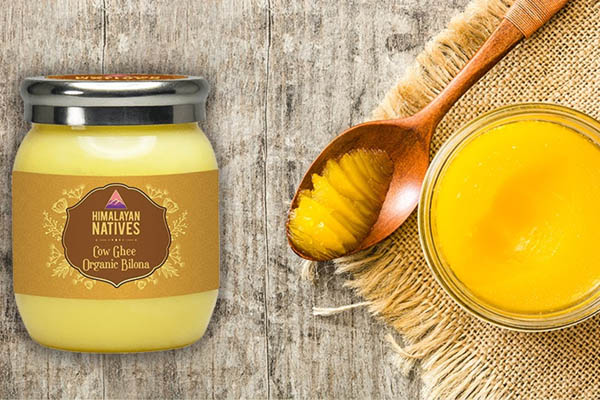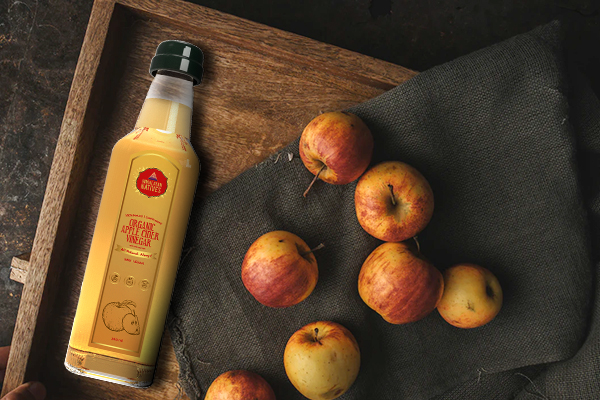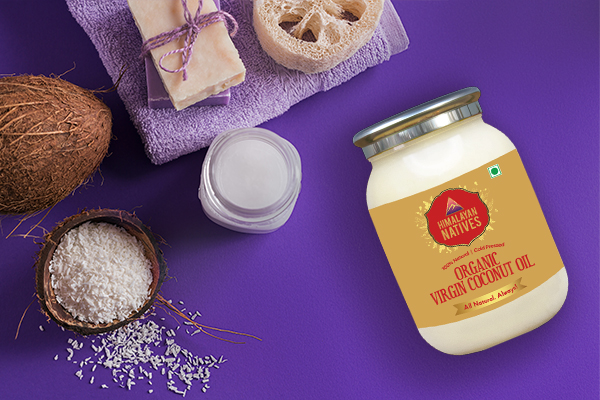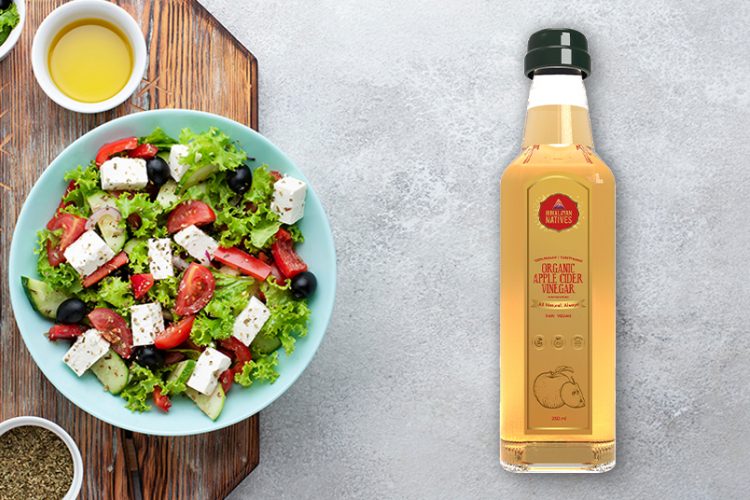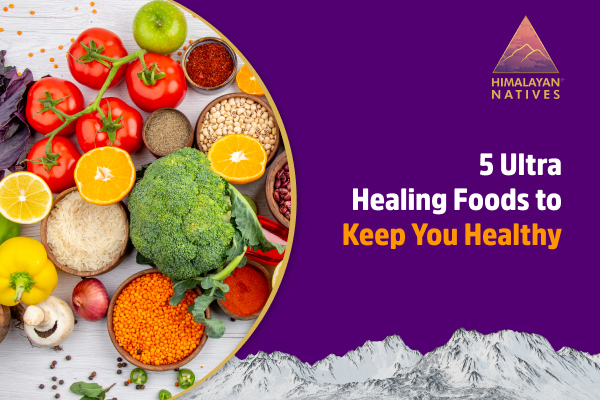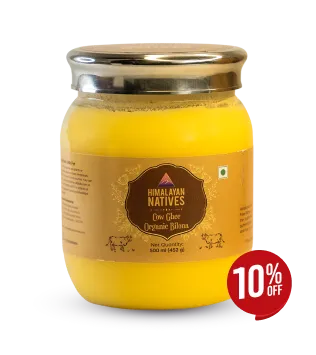
Looking for answers to help you know more about this ancient ingredient, Desi Ghee?
If yes, you have landed in the right spot.
Desi Cow Ghee, the one ingredient that stands out as a superfood in our Indian culinary traditions.
Being a quintessential product in Indian households, it has been cherished for centuries for its aromatic flavour and various health benefits.
Deeply rooted in ancient Indian culture, Desi Ghee is known for its versatile usage, as it's not confined to the kitchen alone, but has also earned a place in Ayurveda due to its exceptional healing properties.
Join us in this blog as we are answering the 7 most frequently asked questions around Desi Ghee, A2 Ghee & Bilona Ghee.
Why is it important to know your Ghee before consuming it?
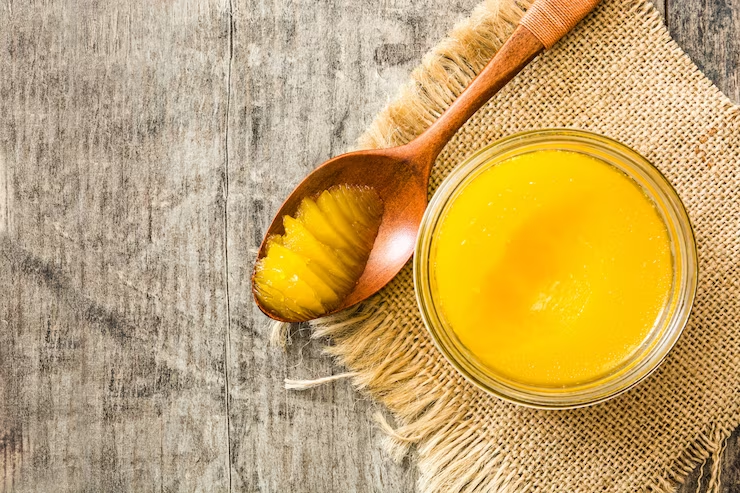
Did you know that the quality of the Ghee you consume greatly defines its nutritional properties and health benefits?
A jar of adulterated Ghee is less likely to provide you with the aromatic flavor and nutrition of Shuddh Desi Cow Ghee. To ensure quality, always be well aware of the making process of your Ghee.
Before moving further into this blog, it's important to bust one common and probably the most popular Ghee myth, that it makes people fat.
That's not true, adulteration and overconsumption can lead to negative effects that outweigh the positives. To fully embrace the benefits of Ghee, it's crucial to choose wisely and consume it mindfully.
With that said, let’s jump onto a few of the most asked questions that will help us understand this Superfood better.
1. What is the significance of Desi Cow Ghee, A2 Ghee, and Bilona Ghee? And how are these different from each other?
Ghee made from milk of cows is called Cow Ghee.
Desi Cow Ghee on the other hand is made of pure milk obtained from indigenous Indian cow breeds.
These Indian Cow breeds produce milk containing the A2 protein, unlike Hybrid or Jersey cows that produce A1 milk. The Ghee made from the milk of our Desi Cows is also known as A2 Ghee.
Bilona Ghee is crafted using the traditional "bilona" method, where curd is churned to separate butter, and then the butter is slow-cooked to produce Ghee. This labour-intensive process ensures that the nutrients and flavour are preserved.
2. What are the nutrition facts of Ghee?
Well Desi Ghee majorly contains healthy fats, protein and carbs.
Did you know, 1 tbsp of Ghee contains nearly 112 calories, enough to keep you energised and feeling fresh all day?
It's rich in fat-soluble vitamins A, D, E, and K, which support various bodily functions.
A2 Ghee also contains butyric acid, a short-chain fatty acid known for its potential digestive and anti-inflammatory benefits.
3. What are the benefits of eating Desi Ghee daily? How does it contribute to overall health?
Desi Ghee, if consumed appropriately offers a plethora of health benefits.
Vitamin Rich: Has A, D, E, & K Vitamins that supports
Healthier Vision
Strong Bones & Muscles
Boosts Immunity
Healthy Fats: Contains healthy fats making it add good cholesterol to the body. Unlike other forms of fat, Ghee does not cause or increase the risks of heart diseases.
Gut Health: Did you know? In ancient times, our ancestors used to have just 1 spoon of Ghee every morning. This helps in lubricating our food pipe and gut, which reduces the chances of ulcers and colon or intestinal cancers.
Healthy Cooking Alternative: Its high smoke point makes it an excellent cooking medium that doesn't break down into harmful compounds at high temperatures.
This means not only will your food be safe & unadulterated to consume, it is also added with Desi Ghee’s nutrition and flavourful aroma.
Aids Weight Loss: Desi Ghee is also known to promote digestion by stimulating the secretion of digestive enzymes.
Contrary to popular belief, it can aid in weight loss as well, as its healthy fats provide a feeling of satiety, curbing unnecessary cravings.
Healthy Skin & Hair: This golden elixir contains a blend of essential nutrients (healthy fats and vitamins A, D, E & K) that contribute to maintaining the radiance and vitality of your hair and skin.
Here’s a detailed blog that will take you on a mind boggling trip with the Ayurvedic Goodness of A2 Ghee and Its Health Benefits.
4. Can Lactose Intolerant people consume A2 Ghee?
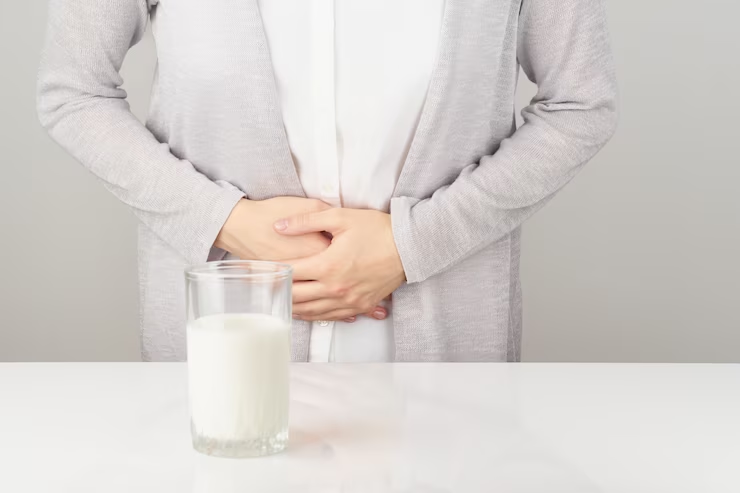
Yes, Ghee is generally well-tolerated by lactose-intolerant individuals.
During the process of making Ghee, the milk solids that contain lactose are removed, leaving behind the clarified butter. As a result, Ghee contains very minimal to negligible amounts of lactose.
This makes it a suitable option for those looking for a healthier alternative for butter and cooking oils. However, individual sensitivities can vary, so it's recommended to start with a small amount and monitor your body's response.
5. What are the uses of Ghee beyond cooking?

It's not surprising that the uses of Desi Ghee extend beyond the kitchen and regular consumption.
In Ayurvedic practices, Ghee is utilised for its medicinal properties for over 1000 years now.
From lubricating joints and improving skin health to aiding in detoxification, Ghee's versatility is astounding.
Skincare: Nourishes skin with vitamins, reducing dryness and promoting a healthy glow.
Hair Care: Strengthens hair, minimising split ends and enhancing shine.
Ayurvedic Massage: Supports relaxation and detoxification, aiding joint health.
Lip Balm: Moisturizes lips, preventing chapping and promoting softness.
Burn Relief: Soothes minor burns and promotes healing due to its cooling effect.
Eye Lubricant: Applied externally, it may help alleviate dry eyes.
6. How much Ghee should one incorporate into their daily diet?
No matter the health benefits & nutritional profile of a consumable food product, it should not be overconsumed. While Ghee offers a myriad of benefits, moderation is key.
The recommended daily intake of Ghee varies depending on factors like age, activity level, and overall dietary habits.
As a general guideline, 1 - 2 tablespoons of Desi Ghee per day is considered a reasonable amount to enjoy its advantages without excessive calorie intake.
7. Where can you buy the best and trusted Desi Cow Ghee in India?
The market is flooded with Ghee options, but choosing the right one is essential.
Look for a reputable brand like Himalayan Natives that:
Prioritises quality over quantity, doesn’t mass produce.
Makes their Desi Ghee naturally from the milk of Indigenous Desi cows
Uses traditional methods like Hand Churning Bilona method
Keeps their Cows cruelty free with utmost love and care
Packs their Desi Ghee hygienically and has Food Safety Certifications including FSSAI, FDA & GMP.
Do not take our word for it, our customers testimonials are here:
We hope to have solved all your doubts around this Golden Elixir. With so many options and improved Ghee varieties available in the market like A2 Ghee and Bilona Ghee, one can make wise decisions of including them into our daily diets according to their health and fitness goals.
Undoubtedly Desi Cow Ghee stands as a timeless and cherished treasure food in Indian culture & cuisine. Its health benefits are not only supported by traditional research & practices but also modern science.
So, now when you’ll opt for a jar of Desi Ghee, make sure it is of Himalayan Natives and remember to savour each spoonful mindfully.
We hope to have solved any doubts you had on Desi Ghee before reading this article. If you want to hear and see more from us on our 100% Natural Food Products, hop on to our Instagram and Facebook pages.
 HELPFUL0 people found it helpful
HELPFUL0 people found it helpful
Related Blogs
Subscribe to Our Blogs
and never miss on the latest update!







